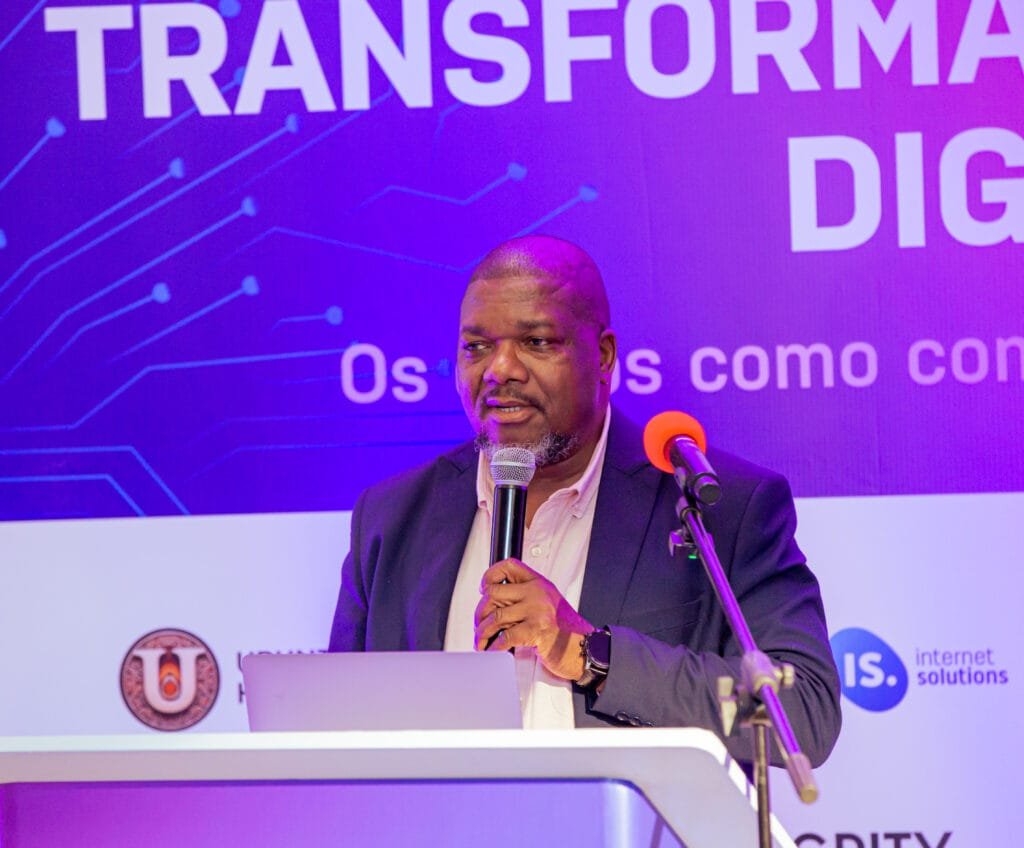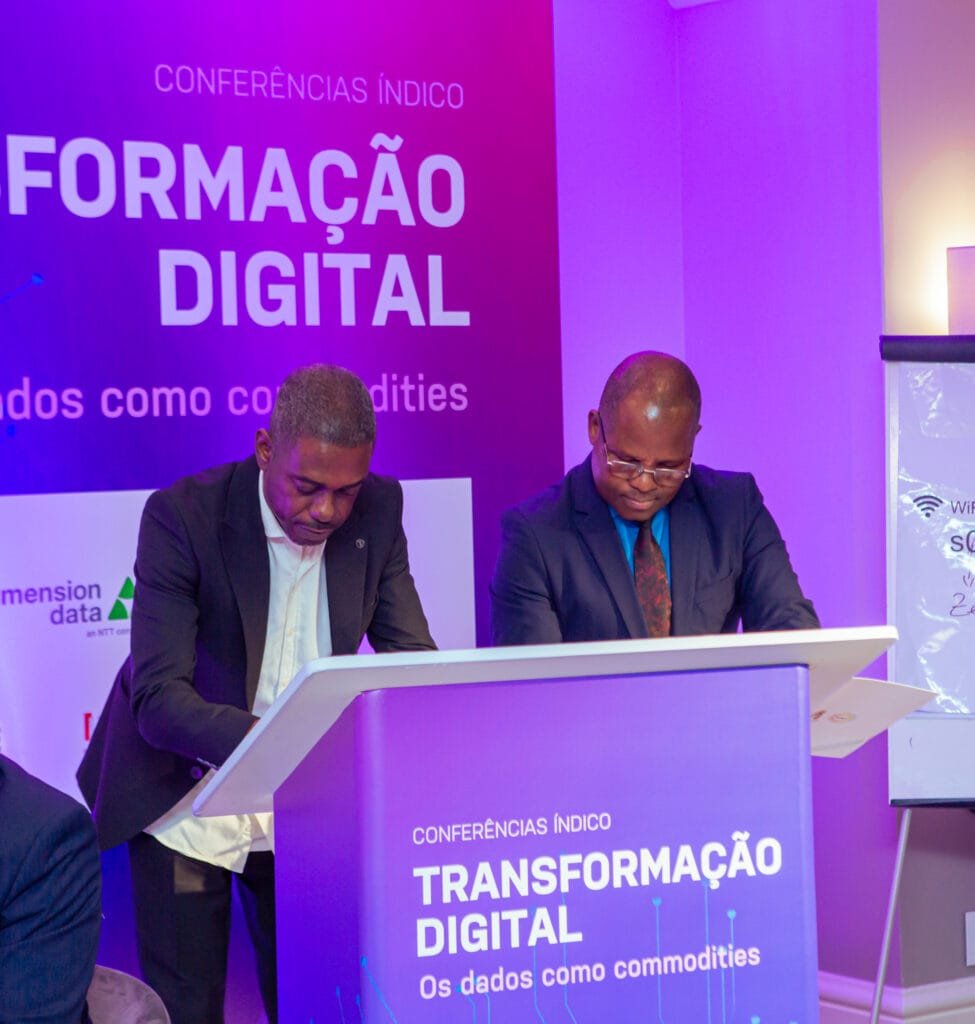Profile Mozambique: Digital sovereignty is today one of the central themes for any nation. What concrete measures can be taken to guarantee digital sovereignty and resilience in Mozambique, in a scenario of growing technological dependence?
José Nhampossa: In Mozambique, we take the issue of data very seriously, as we recognize that it now holds a value comparable to that of oil. Just like the mineral resource, data must be extracted, refined, and managed responsibly. The main difference, however, is that unlike the dependence on natural resources such as gas, oil, gold, or rubies, we have the opportunity to accelerate our economic development by leveraging the transformative potential of data.
However, for this value to remain in the country, we must adopt concrete measures. Among the main challenges, we identify the lack of adequate and accessible infrastructure, both for citizens and for small and medium-sized enterprises as well as public institutions. Without solid infrastructure, data collection, analysis, and management are compromised, reducing our capacity to forecast scenarios and support strategic decision-making.

Another obstacle lies in the absence of interoperability between public and private systems, which generates fragmentation, hinders the sharing of resources, and compromises the effectiveness of digital governance. Today, we face a dispersion of platforms and systems that do not communicate with each other, making access to and the valorization of data difficult. This is one of the critical points we must overcome.
In addition to interoperability, we must also acknowledge the fragility of so-called critical infrastructures, which lack proper georeferencing to support decision-making in areas such as education, health, agriculture, tourism, and even in the prevention of extreme climate events.
PM: One of the core lines of action of the National Science and Technology Parks Company – ENPCT, E.P., is the promotion of innovation. What initiatives are currently underway to support technology startups in Mozambique, and what impact do you expect them to have on national economic development?
JN: At ENPCT, we have been concentrating our efforts on the Maluana Science and Technology Park, where we established an Innovation and Technology Development Center. This center positions itself as a space of convergence between scientific research, entrepreneurship, and technological development, creating the conditions for the incubation of startups and emerging companies.
At present, we have 15 incubators operating in strategic areas such as agribusiness, civil construction, sanitation, solid waste recovery, and digital transformation. I highlight, for example, a startup that collects recycled materials, including discarded fishing nets from the sea, and through 3D technology produces prosthetics and wheelchairs. Another relevant initiative is the production of solar-powered computers, with autonomy of up to eight hours, designed to support distance learning and digital inclusion in rural and remote areas.
We also have startups developing university management systems adapted to the reality of national institutions, providing accessible and effective tools for academic and human resource administration. In another dimension, we note initiatives that focus on the transformation of local products, such as peanut butter produced using machines made in Mozambique, thereby generating added value and promoting a spirit of local innovation.
Beyond startup incubation, we are investing in digital transformation through solutions such as SIGDOC/FASTDOC, an electronic document management platform that streamlines processes, increases productivity, and contributes to the modernization of organizations. Alongside these initiatives, we provide training and capacity-building programs in information and communication technologies, with international certification, with the aim of preparing young people and professionals to innovate competitively.
We are, however, aware of structural challenges. A shortage of investment limits the expansion of our work, given that we are a public company dependent on disbursements from the State, which in turn has multiple priorities. Added to this is the perception of geographic distance from the Maluana Park, located about 60 kilometers from Maputo City, which, without a robust communication strategy, tends to discourage part of the young entrepreneurial community.
PM: Considering the rapid advance of emerging technologies, such as Artificial Intelligence and Blockchain, how can the country position itself to avoid being left behind and, at the same time, ensure that innovation contributes to inclusive growth?
JN: When we talk about the rapid advance of emerging technologies such as Artificial Intelligence, Blockchain, or 5G, we are facing a scenario of great opportunities, but also structural challenges. These tools have the potential to boost productivity, stimulate social inclusion, and drive economic growth, but they require clear strategies from us to ensure their benefits are broadly shared.
In our view, Mozambique must position itself to capitalize on these technologies in order to reduce inequalities, attract investment, and establish itself as a regional hub of innovation. Sectors such as education, health, and agriculture can be significantly transformed with the adoption of digital solutions. In agriculture, for instance, drones can optimize production; in health, the use of electronic health records can expand access; and in education, distance learning platforms combined with technologies such as solar-powered computers can democratize knowledge, especially in rural areas.
We also recognize, however, that uneven adoption of these technologies can exacerbate digital exclusion, particularly in a country where internet penetration remains low. Therefore, it is essential to invest in digital infrastructure, skills training, and robust regulation that ensure ethics, security, and trust in the digital environment. The recent experience of the National Computer Emergency Response Team (CERT), which managed to neutralize thousands of cyberattacks, demonstrates the importance of continuously reinforcing our cyber resilience.
We also believe that innovation must go hand in hand with inclusion. The startups incubated at the Science and Technology Park, which develop solutions such as 3D prosthetics or accessible wheelchairs, are a concrete example of how technology can generate social impact, create jobs, and attract international investment.
PM: Finally, looking ahead, what is your vision of the role Mozambique can play in the regional science, technology, and innovation ecosystem, and what goals has ENPCT set to achieve that positioning?
JN: When we look to the future, we believe that Mozambique can play a central role in the regional science, technology, and innovation ecosystem. Our country has strategic resources, major logistical corridors such as Nacala, and above all, a vision of digital transformation that relies on science and innovation as engines of inclusive and sustainable development.
Through the Maluana Science and Technology Park, we are well positioned to export innovative solutions to the region, ranging from agricultural technologies and irrigation drones to digital platforms for electronic governance. We believe Mozambique can position itself as a supplier of resources, infrastructure, and knowledge, leading regional projects in renewable energy, mining, artificial intelligence, and digital transformation.

The goals we have defined go in that direction. First, we aim to accelerate digital transformation with the implementation of cloud systems and platforms that strengthen data integration and benefit the region as a whole. In parallel, we are committed to investing in the training of young people and professionals, ensuring a new generation prepared for the challenges of science and technology.
Another priority is to secure digital sovereignty and security, reducing external dependence and strengthening national and regional resilience. In this area, the Maluana Science and Technology Park is already developing concrete solutions, such as solar-powered computers and distance learning platforms, which expand digital inclusion, reduce illiteracy rates, and create new employment opportunities.
We also want to promote a culture of innovation and strengthen the national system of science, technology, and innovation. The goal is to foster startups and companies capable of developing solutions for strategic sectors, from health, such as 3D prosthetics and accessibility devices, to more transparent and efficient public services.
In the field of cybersecurity, we have been investing in structures such as the National Computer Emergency Response Team, which has already proven its effectiveness by neutralizing thousands of attacks. This type of investment ensures greater trust in the digital economy and creates the conditions to attract more international investors.
We are aware that challenges persist, such as low internet penetration and high equipment costs. But we believe that, with continuous investment in infrastructure, public-private partnerships, and inclusive policies, Mozambique can establish itself as a regional reference in science, technology, and innovation, in alignment with the African Union’s Agenda 2063.




